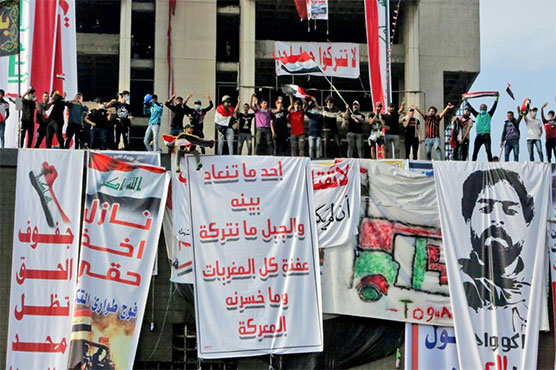Iraq PM's fate on the line as toll from protests rises

Iraq's leaders were in tense talks on Wednesday over the ouster of the country's embattled premier.
BAGHDAD (AFP) - Iraq s leaders were in tense talks on Wednesday over the ouster of the country s embattled premier, as a rights commission said the latest week of anti-government demonstrations has left 100 dead.
As night fell, the government faced the mounting pressure of swelling protests, pro-Iran figures defending the prime minister and deadly rockets slamming into Baghdad s Green Zone.
The missiles hit a checkpoint near the US embassy, killing one Iraqi military member and wounding others, security sources told AFP.
The Green Zone, where government offices and many foreign embassies are based, had already boosted security measures in response to protests demanding the government s downfall.
In the latest week-long wave of demonstrations, at least 100 people have died and 5,500 more have been wounded, the Iraqi Human Rights Commission said.
The commission told AFP most of the casualties were civilians who either suffocated by tear gas, sustained trauma wounds from tear gas canisters or were shot dead.
The number brings the toll since protests first erupted on October 1 to 257 dead and more than 10,000 wounded.
The protests began over poor services, unemployment and corruption, but have since evolved to demand Prime Minister Adel Abdel Mahdi step down.
Abdel Mahdi, 77, came to power last year through a tenuous partnership between populist cleric Moqtada Sadr and paramilitary chief Hadi al-Ameri.
But the premier appears to have lost top-tier support, with Sadr calling for his resignation and early elections.
President Barham Saleh held talks with Speaker of Parliament Mohammed al-Halbussi and Ameri late Tuesday over the premier s ouster, an Iraqi government source told AFP.
Ameri appeared to be resisting calls to bring down the premier, the source said, but a parliamentary session on Thursday could bring a new escalation.
Sadr s Saeroon bloc had "gathered the 65 votes necessary to summon the prime minister, and we hope he will be present" himself, said lawmaker Salam Hadi.
Abdel Mahdi has so far ignored parliamentarians demands he appear in front of them for questioning amid speculation he will face a no-confidence vote.
The kingmakers alliance between Sadr and Ameri has been ruptured by the protests, with Saeroon, the biggest bloc in parliament, endorsing the demonstrators.
The Hashed al-Shaabi paramilitary force, whose political arm Fatah is parliament s second-biggest bloc and is chaired by Ameri, has so far backed the government.
Several Hashed offices were torched in southern Iraq last week, further straining ties.
After an apparent rapprochement between the two blocs on Tuesday night, they appeared to drift apart again.
Sadr took to Twitter on Wednesday to pile on pressure, warning that keeping Abdel Mahdi would "turn Iraq into Syria or Yemen" -- both engulfed in bloody wars.
Meanwhile, Iran s supreme leader Ayatollah Ali Khamenei told Iraqis they should find legal ways to resolve crises instead of hitting the streets.
"The people of Iraq and Lebanon have some demands that are rightful, but they should know these demands can only be realised within the legal frameworks," said Khamenei.
Lebanon has also been hit by huge protests.
The United Nations top representative in Iraq, Jeanine Hennis-Plasschaert, called again for a national dialogue to "unite against the perils of division and inaction."
Meanwhile, the demonstrations have only grown in number in Baghdad and across the south.
Late Wednesday, a cacophony of honking horns, fireworks and blasts from tear gas canisters used by security forces could be heard in Baghdad s Tahrir Square.
Demonstrators have shrugged off a litany of government reform plans and called for a new constitution, reworked electoral law and mass resignations from a government they see as corrupt.
"They should all quit and we should have a national salvation government," said Alaa Khdeir, 63.
While the premier s departure would be seen as a "victory" for demonstrators, it would "give protests a break but not break them," said Maria Fantappie, an Iraq analyst at the International Crisis Group.
"Even an election with the same election law would bring (the) same figures into parliament and the same process as last year in selecting the prime minister, which puts you once again at square one," Fantappie said.
Since the US-led invasion that toppled dictator Saddam Hussein in 2003, Iraq s political system has been gripped by clientelism, corruption and sectarianism.
The country is ranked by Transparency International as the 12th most corrupt in the world.
That means getting a job in government -- by far the country s biggest employer -- is often secured with bribes or connections.
Anger at the state of affairs had been swelling among the youth, who make up 60 percent of Iraq s nearly 40 million people.
Youth unemployment stands at 25 percent, while one in five live below the poverty line, despite the vast oil wealth of OPEC s second-largest crude producer.

